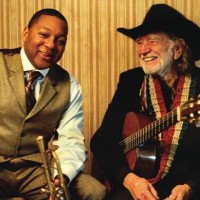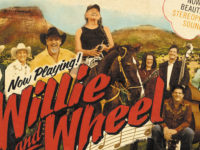The Quickies columns have been settling into a theme of late, a theme of pimping obscure jazzers, especially whack jazzers. Hey, I can do nothing but that for years on end, but then I’d be skipping over some albums worthy of salute that come the more mainstream side of music. By “mainstream,” I don’t mean I’m going to be chatting up the latest Rick Springfield or Miley Cyrus record, but nonetheless, names everyone has heard of. Most probably you’re well aware that these names have new records out.
Here are some releases of the last couple of months by living legends who after all these years are still putting out quality product. You can safely add any of these to your record collection and impress your friends without getting those “who in the hell is THAT” looks on their faces.
Willie Nelson & Wynton Marsalis Two Men With The Blues
A country music icon teaming up with a jazz icon would seem to most to be an even stranger pairing than, say, a heavy metal icon with a bluegrass icon. But followers of both Willie Nelson and Wynton Marsalis would know that there’s hardly anything unnatural about these two teaming up to make music together. For the red-headed stranger is no stranger to the blues; he even made all-out blues record back in 2000 (Milk Cow Blues) and most of the songs were rendered in the graceful, blues-jazz style of Bessie Smith, or more recently, Eddie “Cleanhead” Vinson. Better yet, go back to 1978 and his landmark re-imaginings of classic jazz standards on Stardust. Nelson even guested on a Herb Ellis record saluting Western swing as a session guitarist without sounding out of place.
Marsalis, on the other hand, has long been a keeper of the flame of old-timey jazz, including from the time when the lines between jazz and blues were still blurry. He adores the same old classic tunes that Willie does and loves to render these songs with a strong sense of swing that strangely fits well with Nelson’s nasally, singular vocal delivery.
Captured live over a two-night gig at the Lincoln Center, it was the perfect setting; great acoustics and no studio rehearsal was needed to play songs these guys know so well, anyway. Wynton’s band is supple, tighter than a drum and swings as hard as Count Basie when called upon; Nelson gives them plenty of space to strut their stuff, too. At the same time, the old cowboy is in charge of things, delivering his lines stubbornly his own relaxed, slightly melancholy way, but then again, his own way usually transcends whatever setting is presented to him. By the way, if you liked “Rainy Day Blues” and “Aint’ Nobody’s Business” from Milk Cow Blues, wait until you hear it with Marsalis and his crack band backing him up. Moreover, if “My Bucket’s Got A Hole In it” doesn’t make you nod and grin, you’re lacking a pulse.
I’m not one to run out and snap up everything either Willie Nelson and Wynton Marsalis puts out, but this collaboration of two national treasures is special. They bring out the best of each other and further earn the icon status that each have earned so many years ago.
Dr. John And The Lower 911 The City That Care Forgot
It was perhaps apropos that the consummate ambassador for New Orleans music would be the first to come out with an album responding to the city’s devastation left behind by Hurricane Katrina; Sippiana Hericane was short and perhaps not fully realized, but it was out a scant three months after the catastrophic event and captured Dr. John’s initial shock, sorrow and ultimately hopeful reaction to it.
Now, nearly three years later, Dr. John has a more fully formed commentary on Katrina and the sorrow and hope has now turned to rage. The message is directed squarely at the Washington politicians and is blunt: we’re still suffering and in your greed, you’ve forgotten about us.
The good thing about the anger is that angry artists tend to be more invested in their work. There’s a certain grittiness that’s been missing from most of Rebbenack’s work for a couple of decades and it’s great to see him return to the sound of his Allen Toussaint days when The Meters and the Bonnaroo Horns backed him up. Those roles are filled quite amply this time by Dr. John’s Lower 911 band, who have been on board for the third Dr. John record in a row, now.
As is the trend seems to be these days, this record is stuffed with a parade of special guest appearances, but unlike most such records, it doesn’t disturb the vibe much. Eric Clapton’s tasty licks on tracks like “Time For A Change” and “Stripped Away” build upon a long history as a vastly underrated sideman. Fellow New Orleanian Terrance Blanchard contributes his trumpet on a couple more tracks. Dr. John is joined on a singing duet with—who else?—Willie Nelson, although Willie’s appearance here doesn’t match up nearly as well as the above collaboration with Marsalis.
Perhaps the most important guest contribution comes from legendary Cajun songwriter Bobby Charles; he helped Rebbenack pen five of this set of all-originals and wrote one more by himself. The songs recall the the golden age of New Orleans funk but there’s fury with that funk. The anger is reflected in songs of frustration (“We Gettin There”), indignation of greed (“Black Gold”) and environmental concern (“Save Our Wetlands”), and a plea for help (“My People Need A Second Line”).
Not every song is memorable, but the focus on the theme makes even the lesser tunes hold together with the better ones. Just when people might be ready to roll their eyes at yet another Katrina-themed album, Dr. John delivers one of the most sincere profferings of a message from that event with a man clearly inspired to bring enough of his “A” game to make sure people are listening.
John Mellencamp Life, Death, Love And Freedom
Last year I put both a John Mellencamp album (Freedom’s Road) and a T-Bone Burnett-produced album (Raising Sand) spots on my year-end
All-Star lists. This year, the two got together to make Mellencamp’s next record, Life, Death, Love And Freedom. You better believe I was eagerly anticipating this one.
I’ve read some press on this album that suggested Mellencamp was going a Bob Dylan route for Life. I didn’t really get that vibe at all, because it sounds more like he was going further back than Dylan’s time: Pete Seeger, Leadbelly, Woody Guthrie and the like. Most of the dark but down-home lyrics could have fit in fine during the Depression; even the contemporary-minded “Jena” is phrased in Civil Rights-era prose. Yet, it remains vintage Mellencamp; “Troubled Land” is unmistakenly from the same guy who gave us “Hurt So Good” and “Crumblin’ Down.”
Of course, all of this mid-century Americana sounds and imagery is Burnett’s stock and trade, and he supplies his usual heaping helpings of tremelo and reverb, while keeping the arrangements stark (the opening “Longest Days” is accompanied by only two acoustic guitars).
However, the things that make Life such a worthy followup to Freedom’s remains the artist himself. Mellencamp’s songs are of the pen who has at this point of his career can make the biggest impact without needing a lot of notes and the lyrics seem to come out as natural as conversational speech. Moreover, his voice has settled into a weary, reserved rasp that brings out more sincere emotion than the yelling of his salad days ever did; that sneering growl on “John Cockers,” for example, is deadly effective.
At 56 years old and more than thirty years being in the music business, two of John Mellencamp’s best albums are his last two. Some things just get better with age.
Left Lane Cruiser Bring Yo’ Ass To The Table
OK, so I fibbed a little, they’re not all well-known artists on this installment of Quickies after all. These guys do deserve to be known better, though.
Left Lane Cruiser plays North Mississippi style blues like a lot of blues bands do these days, they just play it louder and harsher than anyone else, and that includes the North Mississippi AllStars. There’s nothing subtle or sophisticated about LLC; their music lunges straight for your soul and put a stranglehold on it until you’re involuntarily rocking along.
When I first heard them, I thought they were a three or four piece Southern band presenting a rawer version of the Black Crowes. Turns out, it’s just two guys from Fort Wayne, Indiana. But this ain’t no Black Keys. Joe Evans plays a righteous and riotous slide guitar with snarling lead vocals, while Brenn Beck plays a bass drum, cymbal, washboard, harmonica, and a homemade kit of various thingies to bang on; the dude is just a human multi-percussion machine.
Their debut album Bring Yo’ Ass To The Table came out at the beginning of this year and the dozen originals sound like they were composed on a front porch in Tupelo with a Marshall amp set next to the rocking chair. Even when performing at some record store (as in the video below), their sound comes across big enough to fill a stadium. Here’s a videotaped rendition of one of their softer tunes, “Wash It,” with some barely audible vocals, unfortunately, and Beck wearing a…um…washboard.
- Marshall Allen’s Ghost Horizons – ‘Live In Philadelphia’ (2025) - May 19, 2025
- Satoko Fujii This Is It! – ‘Message’ (2025) - May 14, 2025
- Joshua Banks feat. Nick Lange , “Agila” from ‘Para Sayo’ (2025): Video premiere - May 12, 2025



